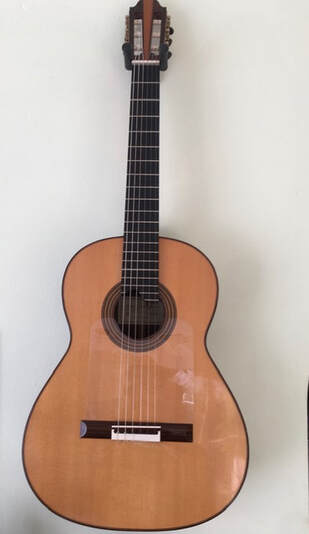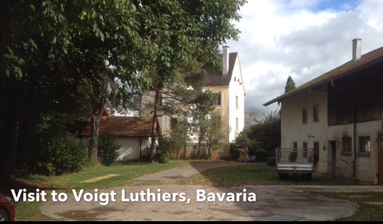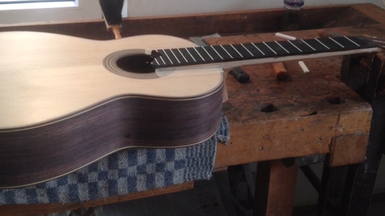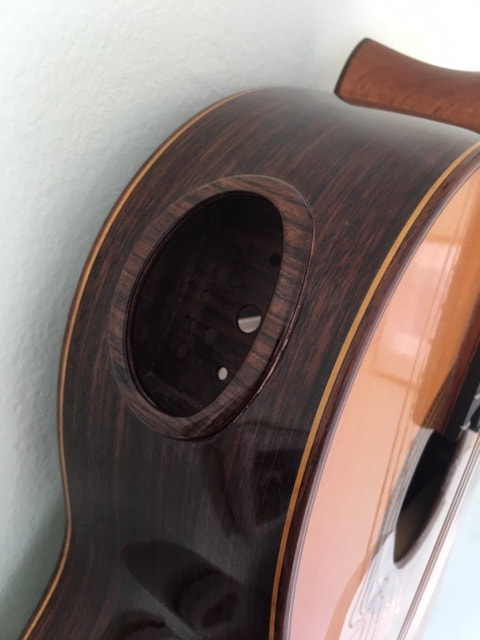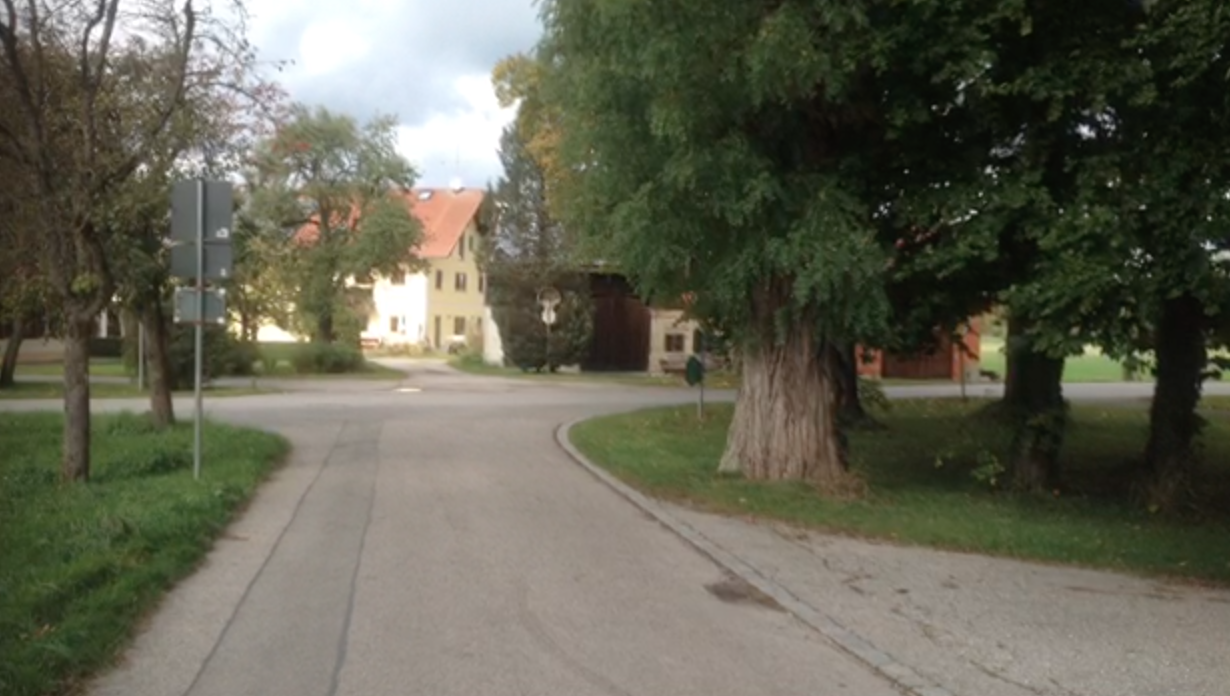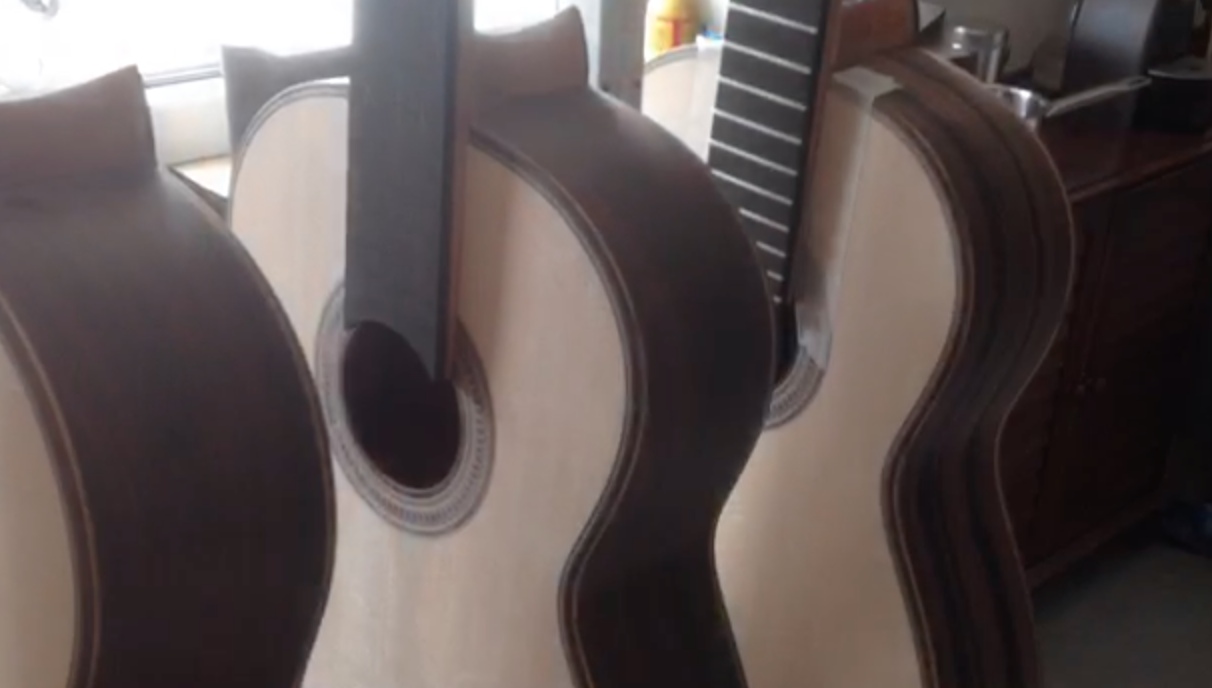Espressivo by Vernon Lacey
‘You must be Vernon,’ Mr Voigt said, from his workshop doorway. Blue eyes radiating welcome.
He invited me in and led the way to the test area. Guitars at different stages of manufacture, face up on benches, hanging on pegs, bound with twine as glue dried, spoke of artisanship, and the tonewoods stacked neatly on shelves, waiting to be born, of their forest origins.
'Japanese,' Mr Voigt said, seeing I took a particular interest in a set of chisels, neatly lined up on a bench. ‘Superb.’ There was not a single power tool in the place.
I'd wanted to buy a new guitar for over a year and a new guitar had meant one thing, one country: Spain. Spain of the Felipe Conde guitars played by Paco de Lucia. Of the Ramirez guitars played by Segovia. And in recent times the Marin guitar played by Isabella Martinez. Each one of these guitars has a unique tone. Design. And each captures some strand of the unmistakable magic and mystery, the passion and the pathos, of Spain.
But then a chance conversation with another guitarist brought me closer to home, to Germany where I live. I spent weeks reading. Learning. The Hauser luthiers in Bavaria who made an instrument for Segovia in the 1930's and who declared it the greatest guitar of the era. The Fritz Ober guitars prized by the German virtuoso Johannes Kreusch. And the famed Matthias Dammann guitar, played by the Scottish guitarist David Russell. They were pinnacles of German Technik, and the more I read about them, the more I wanted to learn.
Soon there was a catch. The Hauser guitars could cost €30,000 or more. And even the cheapest of the other German guitars would cost €15,000. And so, with my modest budget, I started to look elsewhere.
In the studio of Voigt Luthiers, I sat under a framed black and white poster of Paco de Lucia. Mr Voigt handed me the guitar, the Conservatorio model, he explained. 'Cedar top, only finished a few weeks ago.'
It was light. Had a deep brown sheen. And the first note set it apart immediately from my ageing, low-end Raimundo Spanish guitar.
‘Coffee?’ Mr Voigt said.
I nodded approvingly, and for the next five minutes I was left to try out the guitar.
‘The sound will improve,’ Mr Voigt said, returning with a Bodum coffee canister. ‘The sound is still dry.’
The aroma of coffee filled the air, compelling the delicate smells of cedar and spruce to withdraw. Sunlight streamed through the window and the workshop was transformed. The face of a newly polished guitar glistened. Gold tuning heads sparkled. And the rosewood body of another was no longer dark brown, but a spectrum of auburn, ebony, and tan.
A lingering church bell rang out the half-hour. Clear and singular. Strange coincidence, I thought.
‘Call me Claus,’ the luthier said as we swapped my coffee cup for guitar. ‘Tell me,
Vernon. Do you have a goal with your new guitar? … Where do you see yourself - say in two, three years?’
‘Well I'm not him,’ I said, pointing behind me at Paco de Lucia. ‘But a guitar - well - it's always been therapeutic. It gives me hours of pleasure. Helps me to switch off - disconnect. Like you do when you go walking in the mountains.’
‘Do you listen to your guitar?’ Claus asked.
‘Listen?’
‘Yes - does it communicate to you, and you with it?’
Silence. Birdsong. Church-like calm.
‘That piece you were playing - ?’
‘Canto de Septiembre? By Cabrera - the Cuban piece.’
‘Yes - the slow one. Now play it again - only on another guitar.’
Mr Voigt picked a guitar from a rack.
‘The Espressivo,’ he said. ‘I believe this might be better for you - you can play well. It will help you grow.’
I took the guitar by the neck. Raised it up and down in my hand. It felt no heavier than a book. Could it project? I thought loud guitars needed solid, sturdy bodies.
'It has a cello shaped back. Convex. To give it strength - and to allow me to miss out the struts. Saves weight.’
Unusually the guitar had an additional sound hole in the side, a ‘Zargenmonitor’, Claus said, facing upwards. I peered inside the apple-size aperture.
.
‘'To create a direct connection with the player,’ he said. You will see - especially if you ever play ensemble.’
I played the first five notes of Canto de Septiembre. They spanned the whole string range and the separation between the notes was crystal clear. It was a guitar in a different class than the Conservatorio.
Mr Voigt sipped his coffee. He bore the look of quiet confidence. The Meister with nothing to prove. Only observe. Listen. Accept. The guitar was a unique Voigt creation. It bore the name of his son - Marc-Julian Voigt. The sum total of over three-hundred years of family tradition and expertise. I continued to play the Cuban piece.
I was nervous. I pressed too hard and my fingers stumbled. Accustomed to a beginner’s guitar I was novice. In my hands for the first time was a guitar of exquisite quality, sound, and playability. I restarted the piece. Easing off the pressure. Finding the notes with a mixture of caution and growing confidence. Claus sat back in the armchair. A discernible smile emerged. It felt like fatherly approval. The resonating basses and contrasting trebles floated on the air, amidst the birdsong and the milky light.
‘2017,’ Mr Voigt said. ‘That's the year the guitar was made. Here in this very workshop. We used the best of everything. It was a development on the former Espressivo. It's only ever been here. A showroom guitar.’
‘It sounds sublime,’ I said
‘Look. Vernon - you have a budget of €2500? Mr Voigt said. ‘Normally the Espressivo sells for nearly €8000. Let me offer you something to help. If you want. You give me the €2500 and pay a remaining €2500 whenever you get the money.
‘€5000?’ I said, astonished. 'Such a reduction?'
‘Yes - it's time to make another one for the showroom.’
‘But - I'm on paternity leave. It could be a year, even two, before I get the money.’
‘Pay me when you can,’ he said. ‘Let's say ... within three years. I’ll always help a musician when I can.’
‘But I have no passport with me. No ID. How can we formalise the credit?’
‘You’ll return. I know you will.’
I looked at the guitar. Frenched polished to perfection. Not a blemish. It had been played, but kept pristine. In a world of data checks, automated payments, Amazon records, it seemed improbable I could leave with such a guitar on the basis of a verbal agreement to return with the final payment. Like an agreement done in ancient times. 'To be as good as one's word' as it was, in the old ways.
Claus got up. ‘Try them both,’ he said. ‘I'll leave you for a while. Take more coffee if you want. He left the test room and, visible through big interior partition windows, took up position at a wooden bench.
I played an Irish piece called O Carolan’s Concierto on both guitars. Quick and lively. Then an air, Blind Mary. From there I played And I Love Her, for solo guitar. Bach's Allemande with its cascading notes and clear ringing of open strings. Each time the Espressivo was streets ahead. It had unparalleled sustain - every note ringing like a bell, pure and true. The strings went down with minimal effort. Here was a guitar of exquisite detail and comfort. The expression of generations of Voigt that had wrought a masterpiece.
I was still nervous. Hesitant about the financial commitment, but inside I knew this was my guitar. It somehow called.
I glanced out of the window, towards the Alps. Between here and there lay dozens of forests and countless trees. It seemed on that balmy spring day some ancient music, the music of nature, whispered, encouraging me to take the guitar whose wood had come from such forests, forests where the wind plays on branches and birds warble original melodies. Here in the workshop was nature transformed by human hand. The Espressivo. As though the songs of nature were captured inside, waiting to awake by the hand of a skilled caller.
I felt humbled. Like a novice about to set out anew.
'You'll grow with the guitar, ' said Claus, bringing with him the smells of wood. ‘Come back some day. And play it again for me.’
‘I will - I'll learn my favourite piece - Mallorca by Albéniz. ‘One day I'll come and play.’
